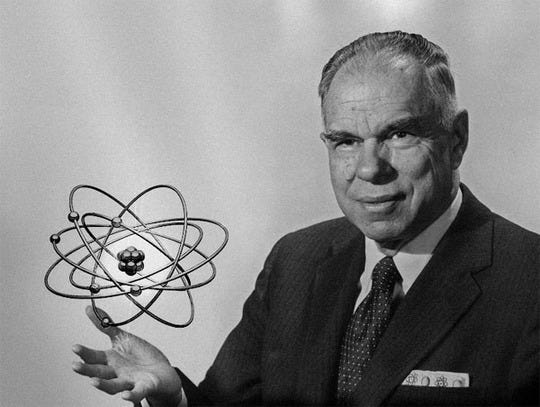#108 - Notes on Elements, Intersections and Relationships
Education Coffee is a 2x Weekly Newsletter on People, Ideas and Culture.
In each edition of this newsletter, I share some inspiring web resources that I have curated after hours of research to ensure that you have the best education coffee in your inbox. In upcoming editions, I will focus on sharing insights, notes and realizations that I gather from people, ideas, books, films and podcasts.
1. Learning from People
Glenn Theodore Seaborg (1912 – 1999) was an American chemist whose involvement in the synthesis, discovery and investigation of ten elements on the Periodic Table earned him a share of the 1951 Nobel Prize in Chemistry. The chemical element seaborgium and the asteroid 4856 Seaborg are named after him. He did not take an interest in science until his junior year when he was inspired by Dwight Logan Reid, a chemistry and physics teacher at David Starr Jordan High School in Watts. This is his #LearningStory.
Seaborg graduated from Jordan in 1929 at the top of his class and received a Bachelor of Arts (BA) degree in chemistry at the University of California, Los Angeles, in 1933. He worked his way through school as a stevedore and a laboratory assistant at Firestone. Seaborg received his PhD in chemistry at the University of California, Berkeley, in 1937. Seaborg was the principal or co-discoverer of ten elements: plutonium, americium, curium, berkelium, californium, einsteinium, fermium, mendelevium, nobelium and seaborgium (that was named after him). In 1951, he was awarded the Nobel Prize in Chemistry for the discovery of these elements.
2. Learning from Ideas and Questions
Love this new series from TED Conferences where two experts intersect and discuss their world views on a specific topic. It is called #TEDIntersections. This is conversation between an actor and a neuroscientist about what make you “you”
3. Learning from Books, Websites and Blog
I love Goodreads. I use it to review books and discover new books. Here are some of the books I read in my 2024 Goodreads Reading Challenge.
I want to read 30 books in 2025. I created a list of books I want to read in 2025. It is a nice combination of fiction and non-fiction. I hope to read widely and diversely this year. I want to read books that challenge and delight me.
4. Learning from Films, Videos and Shows
Robert Allan Caro is an American journalist and author known for his biographies of United States political figures Robert Moses and Lyndon Johnson. Robert Adams Gottlieb was an American writer and editor. He was the editor-in-chief of Simon & Schuster, Alfred A. Knopf, and The New Yorker. They have worked on 6 books together over a 50 year period. I have read several books by them and was curious about their working relationship.
I loved how this documentary focused on the relationship between an editor and a writer and how several parts have to come together to create a book. It also looks at how publishing has changed over the years as this documents an era where a writer would be financially supported for a 50 year period. There are lots of interviews where they talk about their method and why they chose the subjects they chose for their work. Caro has written 5 books on political power and reading these books will help you understand the human condition better! You can rent this film on YouTube!
5. Learning from Podcasts and Music
This podcast episode between Andrew Huberman and Dr. Allan Shore really shifted my thinking on how relationships shape our brain.
Here are some of the lessons I learned:
- They discuss how early child-parent interactions shape brain circuitry.
- They also chat about how the development of right-brain circuitry related to emotional processing regulates physiological responses, influencing adult friendships and romantic relationships.
- It showed me the importance of facial expressions, voice tone and body language in our hope to relate other people.
- Humans need to relate to others in our personal and professional lives to find meaning in our lives.
- We strive when we do and struggle when we don’t.
- A few quality relationships are much more valuable than a large number of acquaintances.
Thank you for reading this edition of #EducationCoffee. I look forward to writing weekly editions of this newsletter this year. I hope to continue to share resources that will add value to your life. You can also review the archive of Education Coffee for free at this link (100+ newsletters here).
Please do send me your thoughts and resources on any edition of this newsletter to abhishekashokshetty@gmail.com. If you would like to read pieces in the future please do consider subscribing to this newsletter by clicking the button below. I love taking these discussions forward on those platforms and look forward to hearing your feedback.
Abhishek





